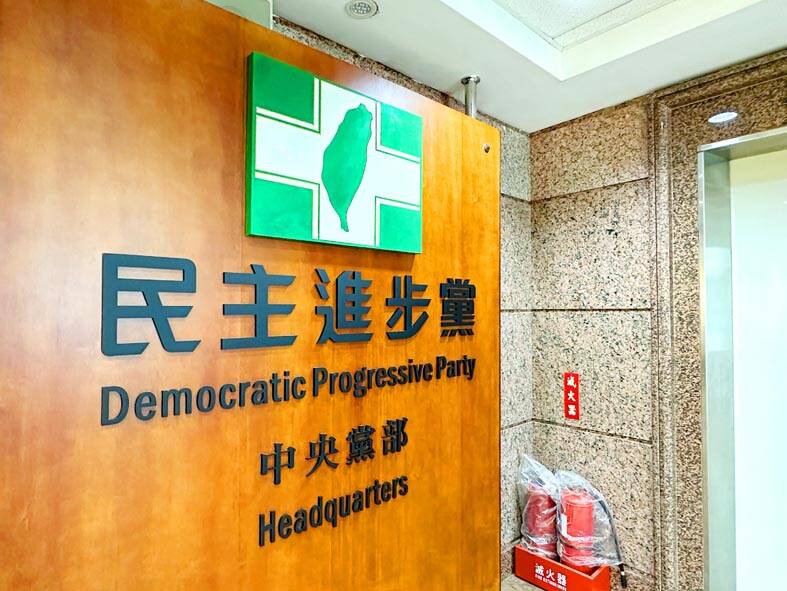Passage of Article 23 of the Hong Kong Basic Law by the territory’s legislature marked “the darkest day for Hong Kong,” the Democratic Progressive Party (DPP) said yesterday, adding that it “strongly condemned” the Beijing-backed bill.
The legislation completed Beijing’s totalitarian takeover of Hong Kong, and the final destruction of the rule of law and human rights that had survived in the territory, the DPP said in a news release, citing the bill’s broad definition of “breaching national security.”
Implementation of Article 23 would have a chilling effect on speech and put every business, non-governmental organization (NGO) and foreigner working in the territory in legal jeopardy, the party said.

Photo: Chen Yun, Taipei Times
Officials at the Chinese Communist Party National Congress in Beijing brazenly ordered the nominally autonomous territory to pass the latest bill, which was done in less than two weeks, the DPP said.
The events show that the Hong Kong government and legislature have become the “thugs and rubber stamps” of China, it said.
China’s behavior in Hong Kong, which contravenes universal values and guarantees made by Beijing, was a demonstration of the regime’s totalitarian character and discredited its “one country, two systems” formula for Taiwan, the party said.
The DPP supports the international effort to help Hong Kong, safeguard democracy and counter totalitarianism, and it remains committed to protecting sovereignty and freedom at home, it added.
The so-called “1992 consensus” and offers of “peaceful reunification” are rhetoric meant to dress up Beijing’s ambition to annex Taiwan, the party said, adding that Taiwan must show strength to protect national security and peace.
The “1992 consensus,” a term former Mainland Affairs Council chairman Su Chi (蘇起) in 2006 admitted making up in 2000, refers to a tacit understanding between the Chinese Nationalist Party (KMT) and the Chinese government that both sides of the Strait acknowledge there is “one China,” with each side having its own interpretation of what “China” means.
KMT Culture and Communications Committee director Lee Yen-hsiu (李彥秀) said that the passage of the legislation underscored “the preciousness of freedom and democracy enjoyed in the Republic of China, Taiwan.”
The KMT urges Beijing to consider whether suppressing individuals’ freedom would bring about better governance, Lee said.

An undersea cable to Penghu County has been severed, the Ministry of Digital Affairs said today, with a Chinese-funded ship suspected of being responsible. It comes just a month after a Chinese ship was suspected of severing an undersea cable north of Keelung Harbor. The National Communications and Cyber Security Center received a report at 3:03am today from Chunghwa Telecom that the No. 3 cable from Taiwan to Penghu was severed 14.7km off the coast of Tainan, the Ministry of Digital Affairs said. The Coast Guard Administration (CGA) upon receiving a report from Chunghwa Telecom began to monitor the Togolese-flagged Hong Tai (宏泰)

A cat named Mikan (蜜柑) has brought in revenue of more than NT$10 million (US$305,390) for the Kaohsiung MRT last year. Mikan, born on April 4, 2020, was a stray cat before being adopted by personnel of Kaohsiung MRT’s Ciaotou Sugar Refinery Station. Mikan was named after a Japanese term for mandarin orange due to his color and because he looks like an orange when curled up. He was named “station master” of Ciaotou Sugar Refinery Station in September 2020, and has since become famous. With Kaohsiung MRT’s branding, along with the release of a set of cultural and creative products, station master Mikan

RISING TOURISM: A survey showed that tourist visits increased by 35 percent last year, while newly created attractions contributed almost half of the growth Changhua County’s Lukang Old Street (鹿港老街) and its surrounding historical area clinched first place among Taiwan’s most successful tourist attractions last year, while no location in eastern Taiwan achieved a spot in the top 20 list, the Tourism Administration said. The listing was created by the Tourism Administration’s Forward-looking Tourism Policy Research office. Last year, the Lukang Old Street and its surrounding area had 17.3 million visitors, more than the 16 million visitors for the Wenhua Road Night Market (文化路夜市) in Chiayi City and 14.5 million visitors at Tainan’s Anping (安平) historical area, it said. The Taipei 101 skyscraper and its environs —

Taiwan on Friday said a New Zealand hamburger restaurant has apologized for a racist remark to a Taiwanese customer after reports that it had first apologized to China sparked outrage in Taiwan. An image posted on Threads by a Taiwanese who ate at Fergburger in Queenstown showed that their receipt dated Sunday last week included the words “Ching Chang,” a racial slur. The Chinese Consulate-General in Christchurch in a statement on Thursday said it had received and accepted an apology from the restaurant over the incident. The comment triggered an online furor among Taiwanese who saw it as an insult to the